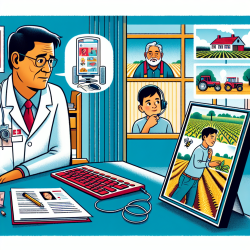Introduction
In the field of speech-language pathology, understanding environmental factors that affect health is crucial. The study "Factors associated with self-reported, pesticide-related visits to health care providers in the agricultural health study" offers valuable insights into how pesticide exposure impacts health, which can indirectly influence communication and cognitive development in children. This blog post aims to explore the findings of this study and discuss how practitioners can utilize this information to enhance their therapeutic practices.
Key Findings of the Study
The study analyzed data from 35,879 licensed pesticide applicators and identified several factors associated with increased health care visits due to pesticide exposure. Key findings include:
- Commercial applicators had higher odds of health care visits compared to private applicators (OR = 1.77).
- Frequent use of insecticides (70 times or more) increased the odds of health care visits (OR = 1.43).
- North Carolina applicators had higher odds of health care visits compared to those in Iowa (OR = 1.35).
- Applicators who mixed their own pesticides or repaired their equipment had higher odds of health care visits (OR = 1.65 and OR = 1.12, respectively).
- Female applicators and those with higher education levels had lower odds of health care visits.
Implications for Speech-Language Pathologists
As practitioners focused on creating positive outcomes for children, it is essential to consider how environmental factors like pesticide exposure can affect the populations we serve. Here are some ways speech-language pathologists can apply these findings:
- Awareness and Education: Educate families and communities about the potential impacts of pesticide exposure on health, particularly in agricultural regions.
- Collaborative Efforts: Work with other health professionals to monitor and address health concerns related to pesticide exposure, ensuring a holistic approach to child development.
- Advocacy: Advocate for safer agricultural practices and policies that reduce pesticide exposure, thereby promoting healthier environments for children.
- Research and Development: Encourage further research into the long-term effects of pesticide exposure on communication and cognitive development, contributing to a broader understanding of environmental health impacts.
Encouraging Further Research
While this study provides a foundational understanding of the relationship between pesticide exposure and health care visits, it also highlights the need for further research. Speech-language pathologists can play a pivotal role in advocating for and conducting research that explores the broader implications of environmental health on communication disorders.
Conclusion
Understanding the factors associated with pesticide exposure and health care visits is crucial for speech-language pathologists committed to improving outcomes for children. By integrating these insights into practice, practitioners can contribute to healthier environments and more effective therapeutic interventions. To read the original research paper, please follow this link: Factors associated with self-reported, pesticide-related visits to health care providers in the agricultural health study.










